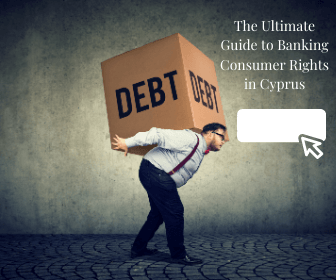The Ultimate Guide to Banking Consumer Rights in Cyprus - Part II - Interest Rates
January 17, 2021Read the guide in our flipbook below. To get a copy of the flipbook, please email [email protected]
From the consumer’s perspective, much of the human cost of predatory banking tactics comes down to two innocuous words: interest rate.
Often, the headline on a banking advertisement for a mortgage is some low figure like 1.3 percent, a number which looks unthreatening, benign and easy to pay back. Unfortunately, the banks often abuse consumers’ trust by overcharging outrageously on interest.
If you took a 20-year mortgage to buy a house at a 1.5 percent interest rate, you’d have certain expectations. The bank is obliged to tell you clearly how much the overall cost of the loan will be by the end of the term. If the house price is EUR200,000 and you end up paying EUR400,000 because of the cost of the loan, you may decide it’s not worth it. Either way, you need to know clearly from the beginning what the real price is for that house.
The banks take care to keep things fuzzy for the consumer.
You don’t have to take our word for it. The Consumer Protection Service and Financial Ombudsman have issued decision after decision on unfair loan terms, overcharging on interest rates and other predatory lending practices which abuse your consumer rights to fair treatment.
Euribor
There are two key legal points about the bank’s right to charge interest on loans. The first is a law passed in 2008 obliging all local banks to connect their rates to Euribor rates. Euribor rates track the European Central Bank’s (ECB) refinancing rate, which is current set at zero percent in order to support the economy.
The main objective of the ECB is to maintain price stability in the euro area. To this end, the ECB uses interest rates to affect financing conditions in the economy. By steering financing conditions, the ECB can influence the overall level of activity in the economy and can ensure that the inflation aim is met.
European Central Bank
The logic is that banks should be taking the opportunity to keep interest rates low since the cost of money is at zero.
Inflation = cost of goods and services to consumers
The inflation rate is a benchmark to show you a range of cheap to expensive prices for goods and services. If prices become too expensive too fast, the inflation rate may rise over two percent. To keep the inflation rate in check, the ECB might raise its key interest rates. The banks would likely follow suit.
Since the economic and financial crashes of 2008 and 2013, the ECB kept its key rates at the level of zero or even negative. The same cannot be said of the retail banks in Cyprus. At some point, they were charging the highest rates in the EU.
So if your loan simply isn’t going down in accordance with your expectations and installments, it’s probably not your imagination. At this point, many borrowers turn a blind eye and hope things will work themselves out.
Trust us, they won’t.
What should you do?
You must look into it because the consequences are serious.
If you’re good with numbers, you can follow the current and past Euribor rates and apply them to your loan to see if you’re paying a fair rate to the bank.
Click here to see Euribor rates
By far the majority of consumers are not good with numbers, at least not good enough to do a forensic study of their loan. That means finding a forensic accountant who can do a clear analysis of your loan.
Compound and capitalised interest
The analyst will take into account the cost of money to the bank and the Euribor rates and calculate whether the bank is charging your account fairly. In many cases, there are unlawful charges. These could include compound interest in which interest is charged on interest. Unless you specifically agreed to this, it is unfair and hideously expensive.
Capitalised interest is another bad boy to look out for. In this, the bank adds any unpaid installments to the capital and charges interest on it. This is also unfair in the case that the borrower is already in financial trouble and would face difficulty repaying the higher capital and higher interest.
Capitalised and compound interest are often simply unaffordable in economic downturns, which is when the banks can decide to foreclose on your property.
Your loan may also have fixed interest or variable interest attached to it.
Fixed Rate Interest
Fixed Rate Interest offers borrowers a fixed interest percentage to pay back over an agreed period of the loan. This helps borrowers to calculate their repayments as the fixed rate is unaffected by market increases. However, the repayments will also not go down should the market rate decrease. A fixed rate helps take away the risk of not being able to pay an unexpected higher monthly repayment, but also removes the possibility of benefiting from lower monthly payments should the market rate go down.
Variable Rate
Interest Variable Rate Interest allows the lender to increase or decrease the interest rate at any point during a credit agreement, normally but not always as a result of fluctuations in the market base rate (Euribor). A borrower on an variable rate risks being is less able to afford the repayments if the interest rates rise but is able to benefit from more affordable repayments if rates fall.
Amortisation table
The best way to see the interest rate charges is to ask your banker for an amortisation table. This is not a payment schedule. Instead, this chart specifies how much of your installment was paid into the capital (the amount you borrowed) and how much is going to the bank (interest rate).
Once you confirm there are unfair or illegal charges on your account, you have to decide the next steps.
Often, the next step is to take legal advice and then talk to the bank about restructuring your loan.
Restructuring
This stage is a negotiation. It’s in the bank’s interest to use go-slow tactics and drag out the negotiation because they’re playing the fun game of simply adding to the charges on your loan. Each day the restructuring goes on is another day of interest earned.
In the case of larger loans, it may be that your lawyer advises you to take legal action in order to suspend the interest charges.
The next part of The Ultimate Guide to Consumer Banking Rights in Cyprus is on contracts, terms and conditions.








